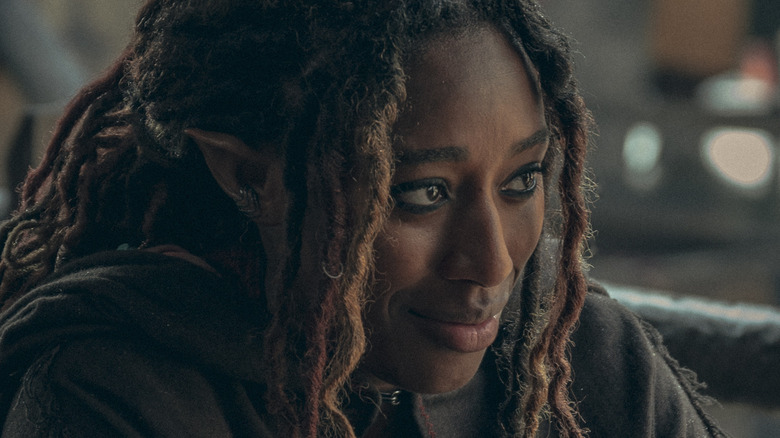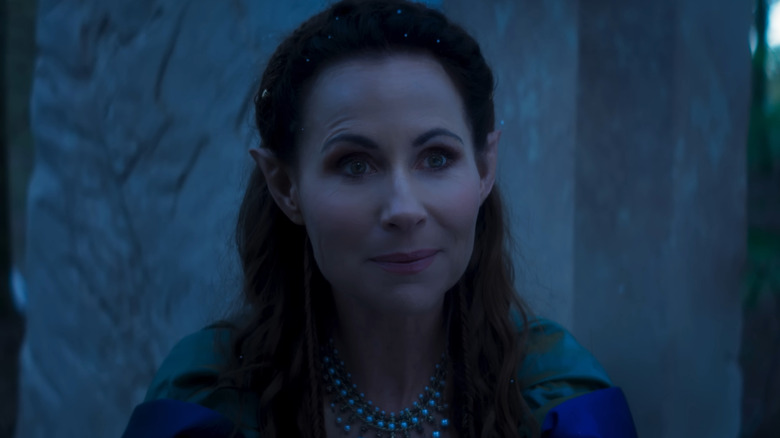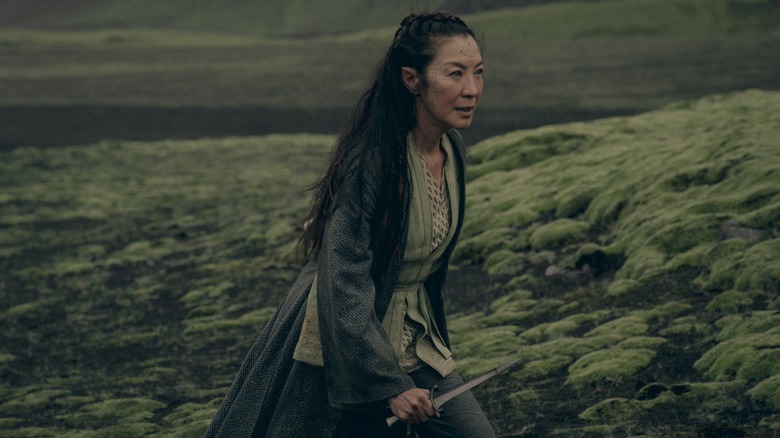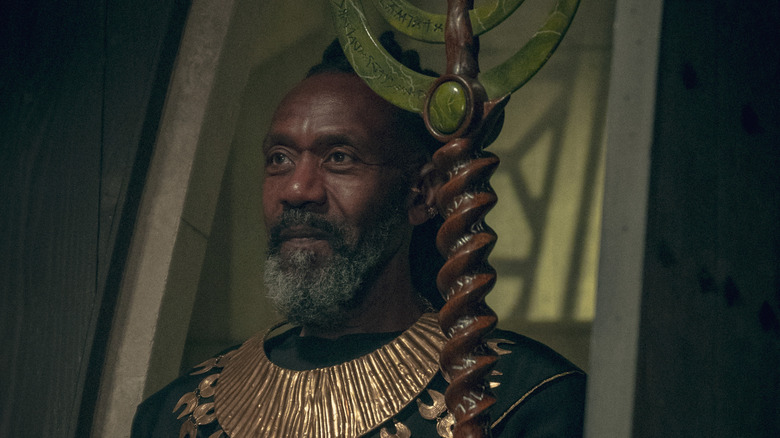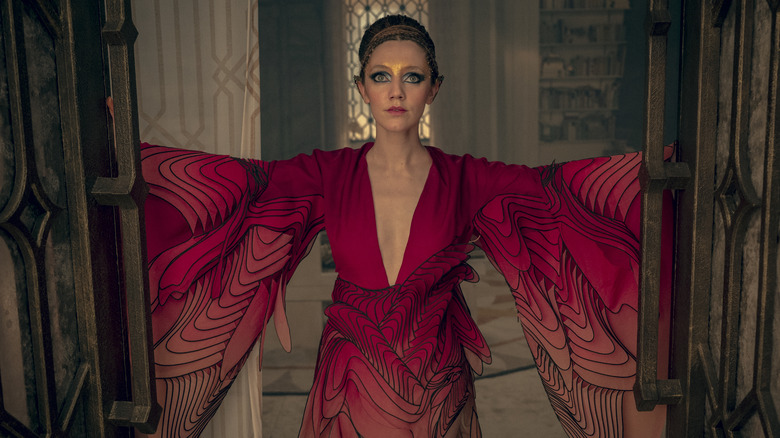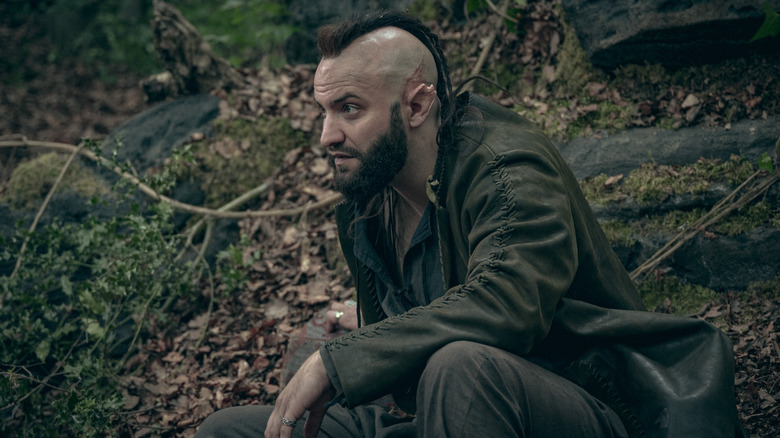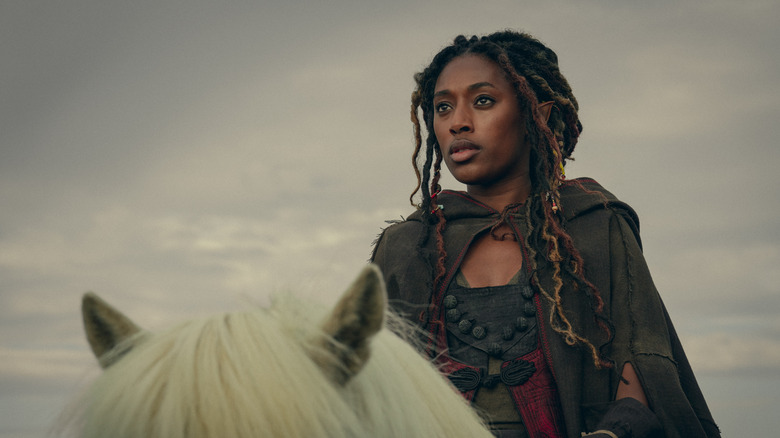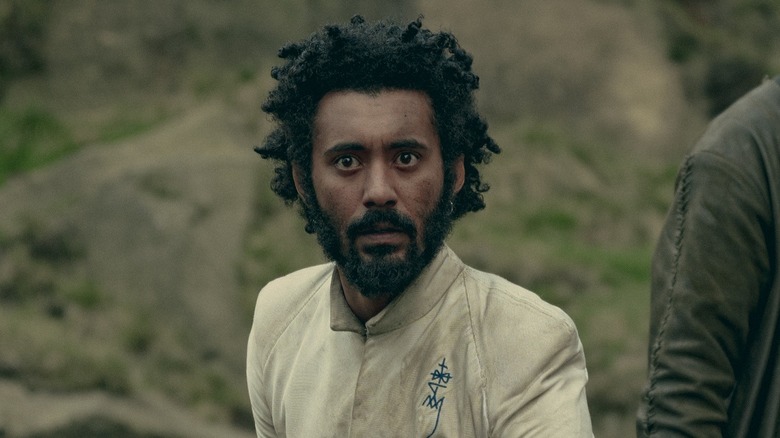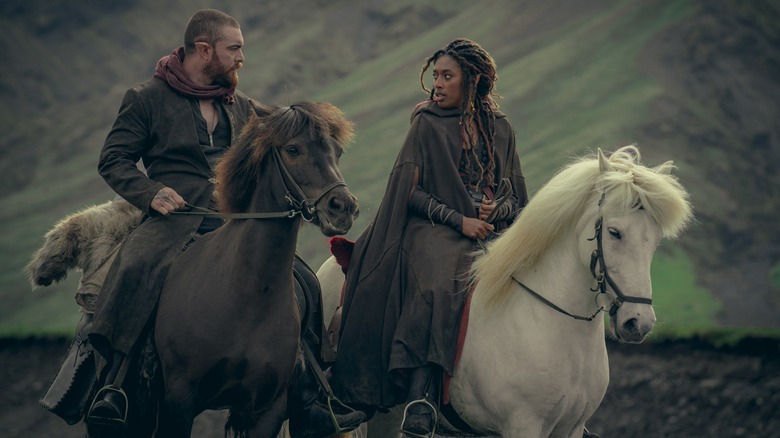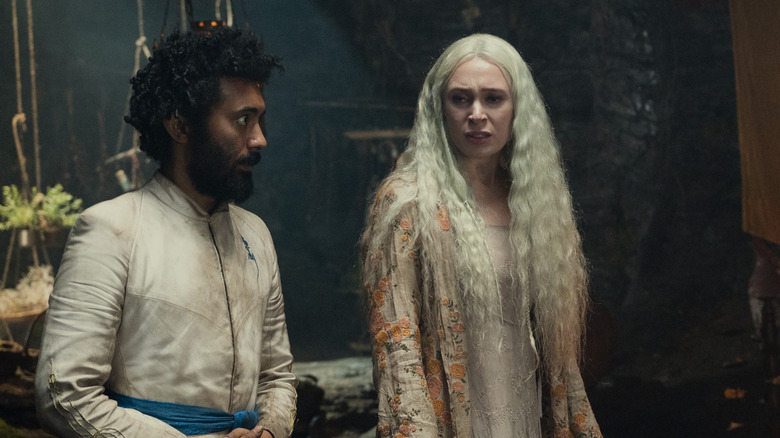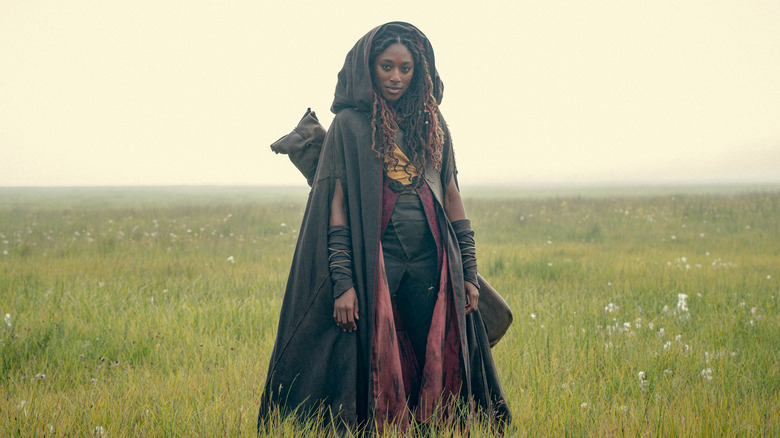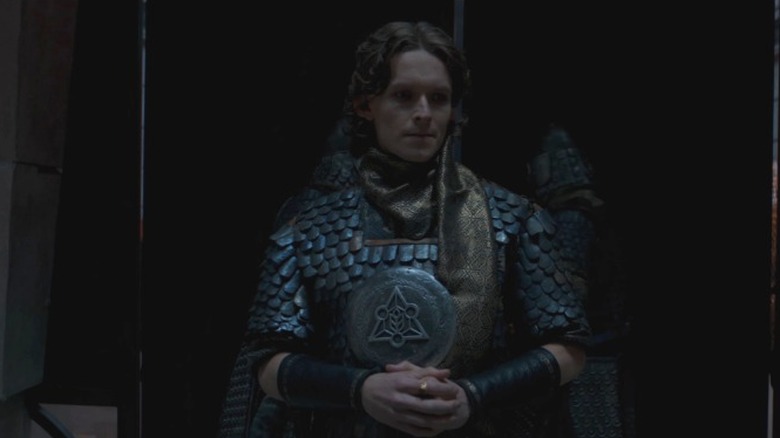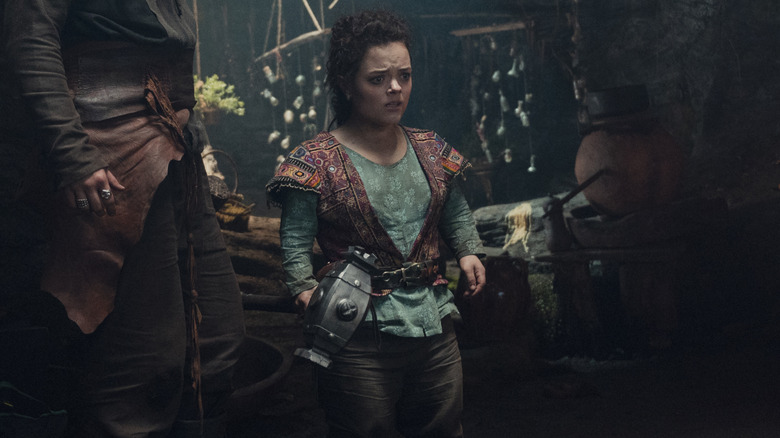The 6 Best And 6 Worst Things In The Witcher: Blood Origin
Fans of "The Witcher" may find their most anticipated Christmas gift this year not under their trees or in their stockings, but on Netflix, with the streaming service releasing all four episodes of the prequel miniseries "The Witcher: Blood Origin" on December 25. This self-contained presentation tells of the days of Elven dominance on the Continent, more than 1,000 years before the life of Geralt of Rivia (Henry Cavill) when the mystical Seven come together to battle a new and terrifying evil and create the original Witcher as the ultimate warrior against it.
The show seeks to answer two major questions surrounding the original series — those being the advent of Witchers and the Conjunction of the Spheres that caused worlds to collide and foreign beings to show up in this story. However, as with all shows, there are good aspects and poor ones and things that creators pulled off well, and others that didn't quite make the mark. Therefore, in preparation for your bleary-eyed Christmas viewing, here are the six best and worst things about Netflix's "The Witcher: Blood Origin."
Worst: Jaskier and Seanchai
"Blood Origin" starts with Jaskier (Joey Batey) — aka Sandpiper, aka the Bard, aka various insults — caught in a raging, fiery battle for which he is unprepared. Covered in muck and spinning through the melee in terror, he is eventually saved from imminent death by Seanchai (Minnie Driver), a magical being who can slip between worlds, times, and physical forms. She needs Jaskier to inspire the Elven warriors of his time with a song about the Seven — legendary Elven warriors (and one Dwarf) of yore who brought forth the first Witcher and the Conjunction of the Spheres.
That's a simplified description of what is a convoluted opening filled with insubstantial content. Its sole purpose is to establish the framing of the series — in which Seanchai occasionally narrates (largely obvious) exposition — by introducing the warriors and setting expectations for the run of the series. But they hardly needed a celebrity for that. It would've been just as helpful to have it scroll on the screen like a "Star Wars" opening while spoken by someone with good enunciation.
Aside from the appearance of Jaskier and his snide observation that Geralt will be annoyed the first Witcher is an elf, the show hardly references its predecessor at all. While that isn't necessarily bad, it does call into question the effectiveness of this as a prequel series. Yes, these events technically predate those of "The Witcher," but pragmatically how do they connect?
Best: Michelle Yeoh
It should be a given at this point, but if there's a "best of" list about anything Michelle Yeoh is in, she's automatically on it. That goes for "Blood Origin," where, true to form, Yeoh is a knockout. Whether it's the absolute stillness she infuses into the character of Scian — not just physically but in the manner and bearing — or her otherworldly fighting skills, she radiates confidence, ability, and authority.
Scian is the last living member of the Ghost Tribe, a clan we do not get nearly enough information about over the course of the four episodes, only being told they were murdered and that their sacred sword was stolen. Scian joins the Seven (though at the time it's only the Two) to get vengeance for her tribe and retrieve the sword. Also, she is the "sword master" to the Lark, by which they mean she mentors her and will support her on her quest.
Scian manages to pull off one of the better surprises of the season, perhaps because her character is the least knowable by design. The fact that we don't get to know her more is for sure a downside to the production, but Yeoh is not at fault for that in the slightest. She's a consummate performer, consistently at the top of everyone's game, and the only bad thing to be said about her is that she's not in literally everything, everywhere, all at once.
Worst: Balor as a villain
Introduced from the start as a villain, Balor (Lenny Henry) is responsible for the assassination attempt against the new king of Xin'trea (to become Cintra in "The Witcher" series) early in Episode 1 of "Blood Origin," and many of the evil plots that come about in the series. He's learned how to manipulate the monoliths to bridge worlds and intends to use this power to his ends. He seeks chaos magic — the same kind Yennefer (Anya Chalotra) seeks in the original series, with the same caveats — to reach his goals.
Yet his objectives are undefined outside of a bitter rejection of his status as lowborn. He shows up at intervals to act imposing or commit some heinous act, but ultimately his villainy is aimless and lacking in vision. It's all reactionary to the deeds or perceived insults committed by those around him, and in the end, Balor is little more than a side note. His monster wreaks havoc, but it's the monster that is the real danger, and the chaos magic he eventually acquires comes too late in the series and is easily thwarted by the mages in the Seven.
Even sassy merchant Brían (Nathaniel Curtis) and Empress Merwyn (Mirren Mack) refer to Balor separately as nothing more than "a lowborn with a chip on his shoulder" and "who despises our [highborn] existence," respectively. His most detested enemies see Balor as a passing threat, the cruelest cut of all.
Best: Merwyn as a villain
"Blood Origin," initially presents Merwyn as a typical princess. Caught in the siege on Xin'trea, she reacts shakily to the horrors of the day, then lustily toward her sworn warrior protector Fjall (Laurence O'Fuarain), only to learn in the coming days that her role will be to marry the king of a neighboring kingdom to help bring about peace between the lands.
After this standard setup, however, Merwyn flips the script. She refuses to live the life others have chosen for her and makes big moves to take control of her own destiny. Smart and strategic, she's been overlooked her whole life, and even Fjall — who thought he knew and loved her — never believed she could've been behind the coup that saw all the monarchs and clans extinguished. Merwyn sees opportunities where others see obstacles, though, and even bloodies her own hands in her pursuit of power.
Her only blindspots are in Fjall himself and her own hubris. Despite her betrayal of his entire clan and family, she believes he can still come to care for her and give her an heir. This opens the door for Fjall to be brought to her alive and reveal his new form. Moreover, Merwyn's cockiness regarding her own importance leads her to become, as Éile (Sophia Brown) says, "just another boot" on the necks of her people. She's a much more worthy opponent than any other of the series, however.
Worst: Only four episodes
Cut down from its original order of six, "Blood Origin" is made up of only four episodes — a mere 206 minutes to tell the story of seven central heroes, their quest, their obstacles and adversaries, plus the creation of the first Witcher and the Conjunction of the Spheres. There's too much. Even in a six-episode season, it would be hard to make sure everything was adequately covered, but four episodes are simply not enough. Add on the fact that "Blood Origin" is only going to be a self-contained miniseries, with no later seasons or episodes to supplement it, and we're left with a tale truly epic in scope that's been essentially whittled down to bullet points.
Unsurprisingly, this leaves large gaps in the narrative, as well as whole characters and plot lines that are wildly underdeveloped. Take, for instance, Brother Death (Huw Novelli), a fun and fascinating character that sadly doesn't get enough attention to flesh out his backstory, his talent with cleavers, his motives, or his love story with Zacaré (Lizzie Annis).
Zacaré herself is barely more than a sketch, and her big emotional scene with her celestial twin Syndril (Zack Wyatt) is built on events the audience knows nothing about and has no investment in. Syndril, too, has many of his most influential actions told in exposition or glossed over entirely. That's three whole members of the Seven. The list of other underbaked details across the series is extensive indeed.
Best: Containment of the story
Juxtaposed with the truncated length of "Blood Origin," contributing to its unripened structure, is the self-containment and freestanding nature of the tale that lends to its cohesiveness and comprehensiveness as a TV show. Anyone who watched "The Witcher" having never read the books nor played the video games would need at least three or four episodes of the first season to really understand even a fraction of what was going on. Not only were there standard people and places by the dozen, all with blurry, unfamiliar names but there were also multiple protagonists each leading their own narrative arc on their own separate timelines. It was nearly impossible to keep up.
"Blood Origin" has none of that. The framing tells us who exactly we're going to follow, in an almost entirely linear path, from the beginning to the end. There are no episode-long jaunts following minor characters in flashbacks that will never connect to the plot at large or anything of the sort. "Blood Origin" is a thrilling, easily digestible fantasy series with some great characters, some awesome battles, and quite a few laughs that you won't need a 110-page episode guide to understand. That's a win.
Worst: Syndril's major impact on the plot is lost
Near the end of Episode 2 of "Blood Origin," Syndril reveals that he was the one who found the monoliths and that it was he, not Balor, who discovered they could portal between worlds. Then he tells us he went with Balor through the portal, felt the dangerous chaotic energy in the air, and warned Balor about it. Only Balor imprisoned him to seek the magic unhindered. Syndril continues, saying he somehow escaped the anti-mage jail and hopped over via portal to see Zacaré because, by the way, monolith portals can also go locally. It's a lot of exposition for one scene, and it's unclear why all of it is glossed over in this way.
Some of this information is uncovered in "The Witcher" Season 2, so it makes a certain amount of sense to just summarize the details here, assuming no one watching this series is coming in cold. But there are other events, confrontations, and discoveries that undoubtedly should be a part of the "Blood Origin" series, particularly with Syndril being one of the central Seven and therefore a supposed major player in the events of the show. Everything suggests Syndril's role is key, yet his action scenes are all but erased from the record. It's a major misstep in an otherwise engaging series.
Best: Éile and Fjall as warriors
Not necessarily as romantic partners, because "Blood Origin" simply isn't comprehensive enough to include a reliable enemies-to-lovers story in the midst of everything else, but Éile and Fjall are spectacular warriors in their own rights. Fjall with his giant ax and Éile wielding her tiny daggers presents a dichotomy of fighting styles that still manage to work together in an almost graceful concert.
Whether they are fighting against each other, separately, or as a team, their moves are powerful and impressive and both draw the eye equally, which must be why they're almost never in the same shot mid-brawl. Well, that or the stunt doubles. Regardless, they're both exhilarating to watch, and their wry humor mixed with fierce focus make them believable as the most skilled killers of their respective clans. This adds to the believability of their initial animosity, their growing, grudging respect, and their eventual sexual tension. Enemies-to-lovers might be a stretch, but enemies turned lustful is a much less emotionally complex story to tell, and they pull that off just fine.
Worst: Underwhelming magic
It's hard to tell where the problem falls, but the magical abilities in "Blood Origin" appears undeveloped and the combination of visuals and actions doesn't pack the desired punch. For example, Syndril and Zacaré both perform magic with palms facing forward, hands shaking as the magic intensifies. This doesn't always result in a visible stream of magical energy, though. Upon combining their powers, it manifests as lightning shooting from their hands and vines wrapping around the objects of the spell. Not amateurish by any means, but the lightning leaves a lot to be desired, the same way it does shooting from the monster's eyes, turning people to bloody mist.
As for Balor, his magic is fairly straightforward when we see it. No frills, just a burst of light. But when he finally gets chaos magic — magic that is supposed to make him all-powerful — what we actually get is odd-looking fire on his hands that he shoots into streams of flames around the palace. It hardly seems all-powerful, especially considering how easily it's quelled. The Witcher transformation is its own can of worms, but it's safe to say it's grotesque in the extreme. For a show based in magical elements, there are a lot of misses here.
Best: Éile as the Lark
In "The Witcher," Jaskier is the Bard, tasked with singing the songs of the people. His character, however, is so eternally glib that any weight in his tunes, and his seriousness in singing them, is easily undercut. In "Blood Origin," however, the Lark feels her songs deeply.
Having given up her life as a warrior for the Raven Clan, Éile travels the land as the Lark and sings songs of the lowborn rising against the tides, of the lives and legacies the people of the land lead, and of freedom. She speaks from her heart and to the people in her audiences by way of her songs, and this has made her a legend. Even before the events of "Blood Origin," Éile has a reputation and a following as the Lark. People know her, remember her, and seek her out. Even Fjall, living all the way in Xin'trea, has heard of her.
When Balor's coup has usurped all the monarchs and eliminated all the clans, though, and people are forced to flee their homes, they look to the Lark as a beacon. Éile tries to discard the title by then, returning to her status as a warrior to avenge the deaths of her sister and other clanspeople, but the Lark will not be grounded. Everywhere they go, people still know of her and look to her for guidance, leadership, and for hope. She is their inspiration and the seedling of their courage.
Worst: Eredin and Brían's relationship
A homosexual relationship is hardly newsworthy under most circumstances, but in the world of "Blood Origin" — where a man in a dress is among the offerings of the whorehouse Fjall visits and where marriage is not restricted by gender, it shouldn't even come close to being a salient plot point. Why, then, is Merwyn extorting compliance from Eredin (Jacob Collins-Levy) by threatening to expose his relationship with Brían?
The simple answer is that the two men are of different social classes, and that is the detail for which Eredin is being extorted. However, audience members living in a world without such rigid class structures, watching a series in which the class structures are alluded to but never really conveyed as a major divide, it feels like the homosexual aspect is the one that is being shamed, hidden, and exploited. And what purpose does that serve?
The real world we inhabit is already full of homophobic shaming, slurs, and violence, which are causes of untold numbers of shame, closeted behavior, depression, and worse. If the goal is a more diverse representation, great. There are hundreds of ways to showcase a healthy queer relationship in any given television show. This is not one of them.
Best: Meldof and Gwen
Meldof (Francesca Mills) is the only Dwarf member of the Seven. Gwen is her hammer. Together, they form one of the most touching, heartfelt partnerships on TV. Their story, as Meldof reveals in Episode 3 of "Blood Origin," is a tragic one. Gwen was Meldof's love (whether romantic or platonic it's not specified, but it hardly matters), with a scent of mintberry and lilac that lingered in her wake and a long flowing beard Meldof both envied and admired. One day Gwen was killed in a most brutal manner, and Meldof sought revenge by infusing her ashes into a hammer of Dwarven iron.
From that point on, Meldof has spoken to Gwen's spirit in the hammer, has listened to whatever answers she hears back, and has tracked down all the elves responsible for Gwen's death. Mills could not be better in this role, simultaneously playful and furious, sorrowful and sweet. She completely sells the idea that the hammer is responding to her, and if you could only focus you would hear Gwen's replies. Plus she swings that thing around with all the wallop of Thor and Jane Foster combined. Dwarf or no dwarf, ghost or no ghost, do not get on either one of these women's bad sides.
